Swerve
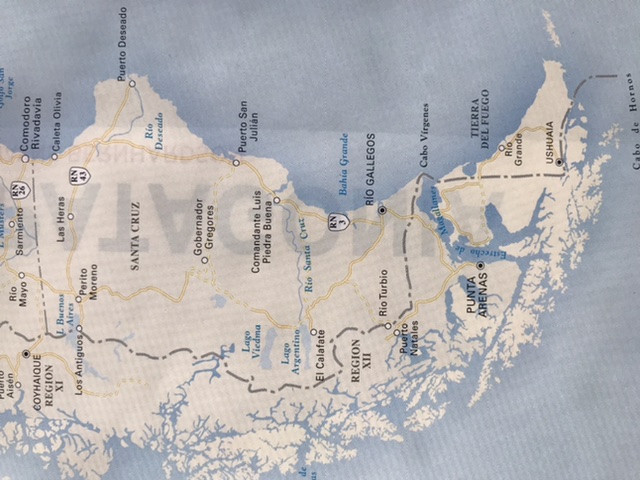
We’d spent two days relaxing in El Calafate.
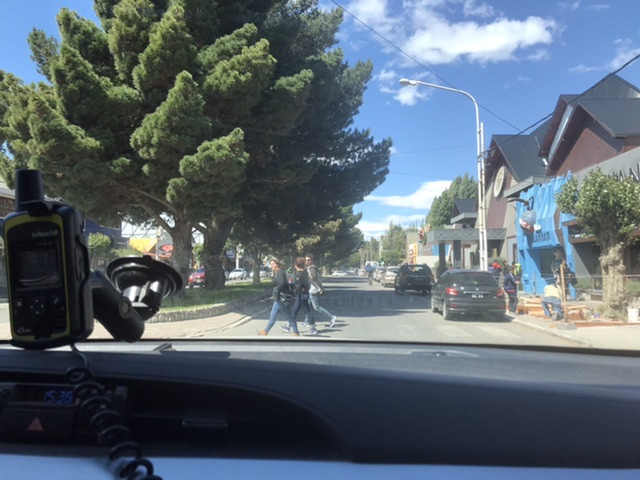
The truck was stocked with food, water, propane and diesel. A mountain of laundry was done and put away.
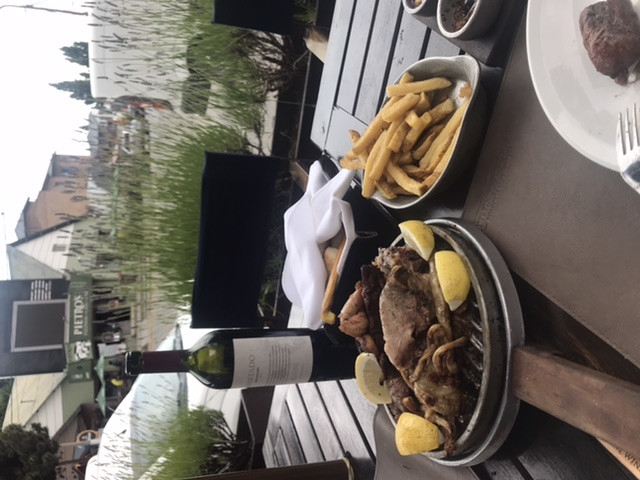
Fine meals were had. Trinket gifts were bought and stowed. We were ready for the final push to La Isla Tierra del Fuego and the city of Ushuia, the southernmost in the world, to check it off the list.
Making our way down R40 we came to a campsite recommended by iOverlander; an old highway construction site. Thinking it was too conspicuous, we continued down a nearby, wide dirt road. The reason for the width of the dirt road was quickly realized as it was full of oil field service semi trucks marked ‘Halliburton’ and other logos. The wind was quite strong and the terrain flat. We noticed a two–track road coming off the main road and we took it. According to the GPS it led to a lake. There might be something there like trees or terrain that would break the wind.
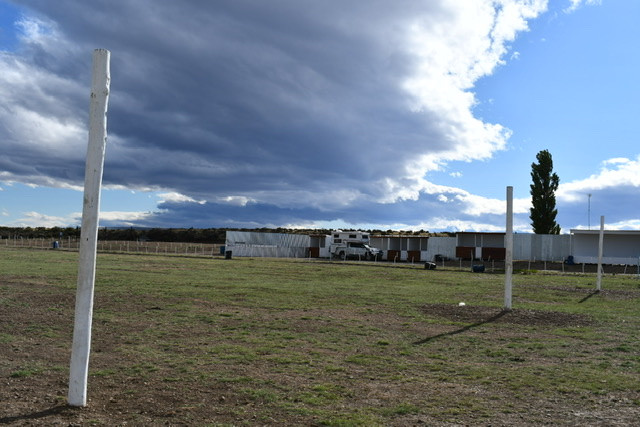
As the lake came into view so did a rodeo grounds. It was an odd thing to find out the middle of nowhere. The grounds were in immaculate condition; recently constructed and painted in the blue & white colors of the Argentine flag. They proved to be below the lip of the lakes ancient shoreline.
It was perfect for tucking-in out of the wind. ‘What great fortune’ we thought as we pulled alongside the vendor buildings and backed-up against the asado pit. ‘This would be our best camp ever.’ A small pick up truck with three young gauchos pulled in within minutes behind us. One had an open, friendly face, a second had a quizzical look of uncertainty and a third, in the truck bed with two motorcycles, had a mean, sullen look of resentment upon his face; an interesting combination. The friendly face inquired in yet a new dialect of rapid Spanish if we were ok. It took a couple exchanges for me to understand. Yes, I replied, everything good. Thank you. He then pointed to a water container behind us, saying it was good to drink, and wished us a good night. As they turned the truck and left the mean-mug kept his eyes upon me as they disappeared into the wind, a dust cloud following them. As unsettling as it seemed, we figured we were OK and kept preparing camp. We pulled the cork on a nice bottle of wine to toast our good fortune and were about to build a fire & cook meat in the asado pit when a second vehicle pulled-in. A young woman was driving, an old gaucho sat in the passenger seat, an old woman of the same age in the rear seats sat alongside a young child. The old gaucho leaned out the open window and looked at our rig with curious approval. I offered my hand and he took it in a handshake. I told him all was well. The older woman in the back immediately chimed-in to say we were on private property and there was no camping. I asked her if we could pay, adding we would leave the place as we found it. “No”, she replied, “if we let you stay there will be another, then another, then another, then another!” (True statement, considering the reach of the iOverlander app). We packed our camp as they slowly drove out of sight, watching behind them, we were sure, to make certain we were on our way.
Our joy was completely snuffed. We made our way out to the main road, remarking that in two months that was the only incident resembling something negative or inhospitable we had experienced in either Argentina or Chile (obscene gestures exchanged in the combat of driving exempted).
As we drove out to the main road we inspected a couple other possible wilderness campsites, none of them offered the privacy or wind protection we were seeking. We found another lake and drove in. While there was a 10-foot berm to cut the wind it was right alongside of a natural gas pipeline, placarded with assorted ‘Danger...!’ signs and in full view of the main road. By now we were paranoid of being accosted, so we decided the site by the highway originally seen would be for us.
For the third time on the trip we were parked at an old highway construction camp site, complete with trees, concrete building pads sans buildings, lots of dangerous, metal staubs sticking up and patches of spilled oil, everywhere. We selected a flat spot behind some trees to break the wind, and set up camp. The oil field service trucks continued their parade on the wide gravel road, about a half-km away, as the buses transferring tourists between the various Argentine & Chilean National Parks did their own parade, forth and back, along Ruta 40, visible about 2km away. For the first time in the trip we were seeing lots of tourist traffic and campers.
As we were cooking dinner we heard the crunch of gravel under tires and looked out the window (with a cringe) and were relieved to see it was another overlander searching for a place to camp. They set up opposite our position within the ring of trees. As they got out we went to greet them. “Hola, buenas tardes!” I hailed. “Hola, buenas tardes. Que tal?” They returned in gringo-accented Spanish. “Are you from North America?” I asked in English. “Yes, we are.”, they replied in kind. We all started laughing.
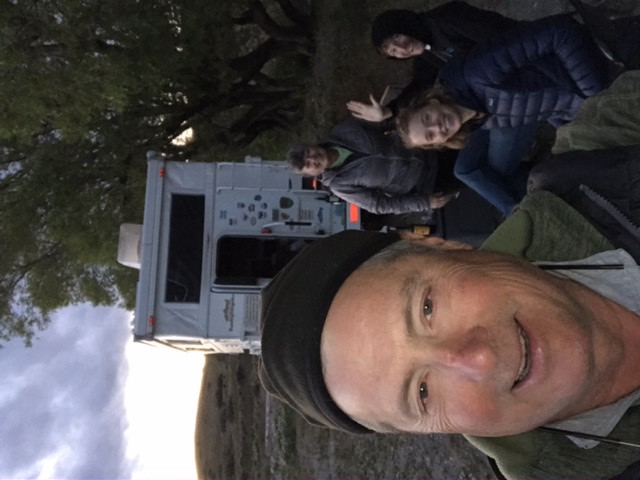
Their names were John and Annie. They were US citizens, living in Colombia teaching English. Presently they were on a one-way, three-week adventure; making their way down the Chilean Austral Highway, briefly into Argentina, then onward to the Chilean city of Punta Arenas. They drove a rental overland vehicle, a small van curiously hand-painted with an art theme resembling that of the late New York performance artist, Keith Herrig. We had seen numerous vehicles from this rental company, ‘Wicked’, with Chilean plates and strange paint jobs (Batman and Robin were one memorable theme), in the last few days as traffic poured out of Chile and into Argentina on their way south to Tierra del Fuego. Their little van had an interior bed that folded into club seating, a small table that could be planted between and, when the rear hatch was opened, an efficient kitchen. Cramped quarters but it would do the job.
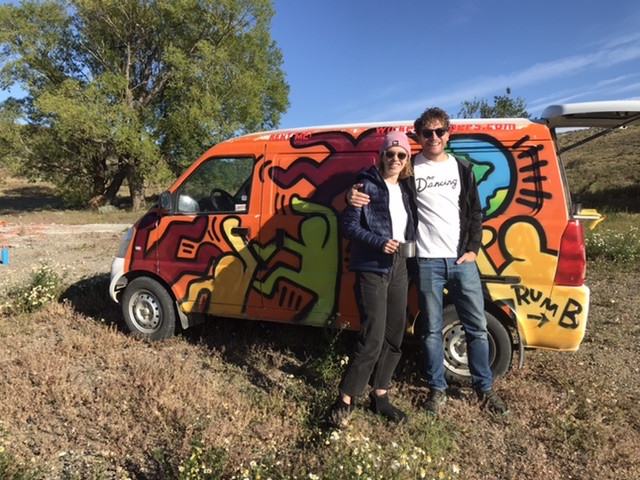
We set up and chatted until about midnight, draining a couple bottles of wine while enjoying speaking in unhindered English for the first time with other persons in many weeks.
We woke up the next morning and had coffee with them. As they were preparing to leave Annie brought over some fruits & vegetables. They were on their way to the Chilean border, and the Chilean customs, we recalled, were absolute sticklers about confiscating any fruits, vegetables, cheeses and meats onboard any vehicle. We accepted their parting gifts, bade them goodbye and watched them join the stream of tourists on Ruta 40.
‘Shit’, we said as we looked at our recently stocked refrigerator, full of beautiful fruits, vegetables, cheeses and meats purchased at the Argentine city of El Calafate. We studied the map and saw the only way into the Argentine portion of the Island of Tierra del Fuego was through Chile.
There was very little time, and even less to do in this flat, windy desert, before we reached the Chilean border. Our choices were: (1) surrender all of our food to the Chilean Aduana, (2) remain here, at this grim campsite, to consume the food or, (3) we could go north to a nearby National Park on the coast then double our way back. We made the decision to go north. We then posed the question, ‘what was there to come back to?’ We then consulted our trusty Moon guidebook, seemingly made for the city tourist, and an overland handbook, the more dog-eared of the two, to see what lay ahead when we turned right and then headed south. What we got was a lot of tourist traffic was going south to either check-off Tierra del Fuego as their objective, or to visit the city of Ushuaia, which is a booming tourist town doubling in size every four years. By the guidebook description Ushuaia was complete with a port full of Antarctic cruise ships, heavy traffic and an oceanfront avenue lined with trinket stores. There was a National Park, and the Argentines don’t let you camp in their national parks, and they were very few, overpriced campsites to accommodate persons of our travel profile: overlanders. We had gotten a taste of that experience already, in El Calafate, and we didn’t like it.
While we’ve had the great privilege to have traveled to the northernmost city on earth, Barrow, Alaska, and it would’ve been cool to gain bragging rights to have visited the southernmost city, Ushuaia, we didn’t feel the need to gain bragging rights. We were living it. We decided to let everyone else in the desperate, migrating throng, line-up with one another at the cruise port and take selfie‘s. Maybe next trip we’ll join them. We turned left and headed north.
